Report from the task force on public history education and employment
14 April 2015 – editors
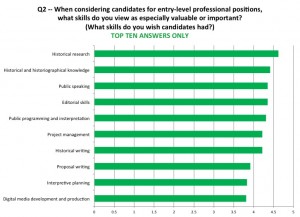
Graphic from public history employers’ survey, showing skills in demand for entry-level employees. Image credit: Public History Education and Employment Task Force
Are there too many public history programs? Where is the field going, and what can professional organizations do to ensure that it remains vital in the years to come? For the past year, a task force organized by the National Council on Public History (NCPH), the Organization of American Historians, the American Historical Association, and the American Association for State and Local History has investigated questions about the current landscape of public history training and employment. Inspired in part by Robert Weyeneth’s essay “A Perfect Storm?,” the task force is charged with gathering data on several key questions. We want to know what skills and abilities employers look for when hiring professionals in the early stages of their careers, where they see the field of public history going, and what skills and expertise will be more highly valued in the future. We want to know if training, particularly at the graduate level, is preparing students for professional employment and long-term career growth. Finally, we want to know what professional organizations can do to ensure production of well-trained public historians and ensure the general health of the field. At a time when concerns about the number of graduate public history programs and possible “overproduction” have become common, we need reliable information about these concerns.
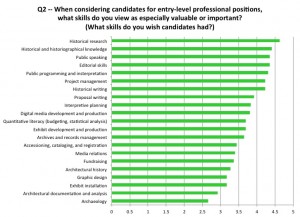
Graphic from public history employers’ survey, showing skills in demand for entry-level employees. Image credit: Public History Education and Employment Task Force
To date, the task force’s main accomplishment has been development of an online survey intended for public history employers: http://svy.mk/1DtNI89. A trial run conducted last fall obtained 38 responses. Select results are shown at right. Although only preliminary, they suggest several findings. On the one hand, they seem to confirm that areas such as fundraising and digital media are highly desirable and will remain so in the future. This is hardly surprising: fundraising is basic to the operations of many historical organizations, and new areas of activity invariably draw interest. At the same time, the survey results also suggest continued demand for knowledge and skills that have long been a focus of training in public history, including historical research and writing, historical and historiographical knowledge, public programing and interpretation, and public speaking, and editing.
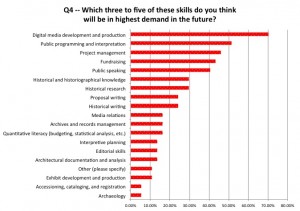
Graphic from public history employers’ survey, anticipating skills in demand for entry-level employees in the future. Image credit: Public History Education and Employment Task Force
The survey is now “live” and open to all public history employers. We encourage you to share it with colleagues and anyone else who may be interested. The goal of the survey is to obtain as much information as possible about what employers look for in hiring entry-level and early-career professionals and what they want for higher-level positions. We are interested to know what skills and expertise prepare students for jobs and, moreover, what they need for long-term career development.
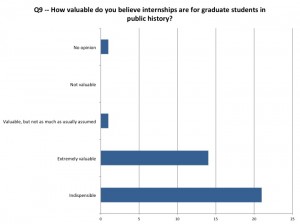
Graphic from public history employers’ survey, assessing utility of internships. Image credit: Public History Education and Employment Task Force
The upcoming NCPH meeting in Nashville will provide an opportunity to discuss the trial results and obtain input from educators, employers, and students. Several members of the task force will hold an open meeting in room CR1-B of the Nashville Public Library at 10:30 a.m. on Saturday, April 18. The library is conveniently located one block from the Sheraton Nashville Downtown Hotel. We anticipate a lively discussion. In particular, we hope that the meeting will provide a forum for sharing information that may not be easily captured through the survey. Please invite friends and colleagues. If you hire public historians, even if only on occasion, please attend. If you are regularly involved in hiring, we want to hear about your experiences. We want to know your concerns and where you think the task force should focus its efforts.
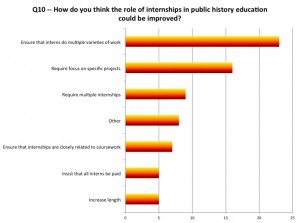
Graphic from public history employers’ survey, assessing internship experiences. Image credit: Public History Education and Employment Task Force
In the coming months, the task force will turn its attention to questions about training and job placement. We need to know if graduates of public history programs, particularly freshly-minted MAs, are obtaining jobs in the field; how many stay in the field over time; and how programs track their graduates. We want to know how well training is keeping up with employers’ needs and expectations. As Weyeneth noted in his essay, it has long been common to presume a disconnect between training and employment. Employers supposedly want to see “practical” skills. Educators stress traditional historical methods and theory. Whether this is actually true and to what extent it can and should be addressed are different questions. Moreover, questions about long-term growth are important. Every public history program wants its graduates to get jobs, but what about five, ten, and fifteen years after graduation? Where do public history MAs wind up? Clearly, individual experiences vary, and a Master’s in public history cannot prepare students for everything they will encounter during their careers. At the same time, it’s important to know if public history programs are providing students with an education as much as credentials for employment. Most aim to do both. Without hard evidence, however, it’s impossible to judge what practices are working and how others can be improved. Before too long, we expect to have the data to offer informed guidance on these and other subjects.
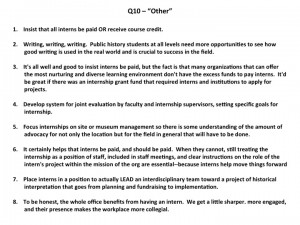
Commentary from public history employers’ survey. Image credit: Public History Education and Employment Task Force
In the meantime, we invite comments about the survey and suggestions about our work. The task force has much to do to fulfill its mandate. Now that the Great Recession has passed and the public history job market shows signs of rebounding, what training and employment-related concerns do you see as most important? What skills do today’s graduates need, and how can educators prepare them for long-term success? We are interested in hearing your thoughts.
~ Philip Scarpino is professor of history and director of the graduate program in public history at Indiana University-Purdue University Indianapolis.
~ Daniel Vivian is an assistant professor of history and director of public history at the University of Louisville.
They are co-chairs of the public history employment and education task force.




I saw a hint of this in the article, but are there plans to create a survey for the graduate students/job seekers perspectives in the future?
Ashley, the New Professional and Graduate Student Committee recently did a survey for students and grads before writing their guide The Public History Navigator: How to Choose and Thrive in a Publjc History Graduate Program. Check it out at http://bit.ly/1G5QIgu
Sorry, this site should work http://ncph.org/cms/wp-content/uploads/The-Public-History-Navigator-2015-Web.pdf